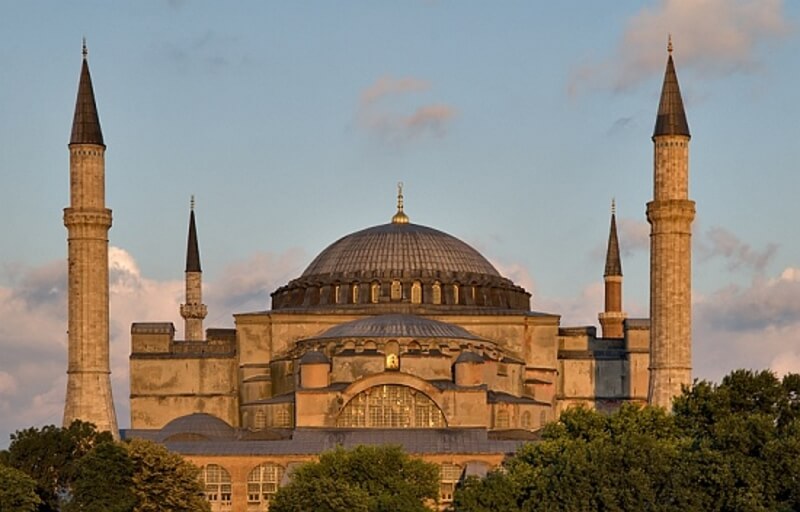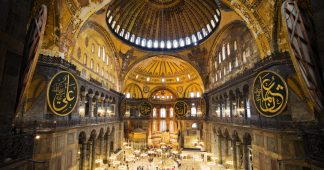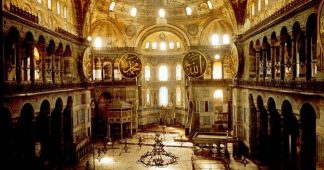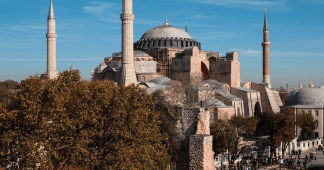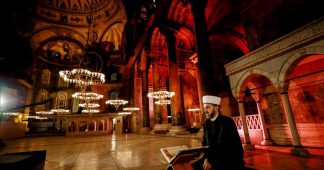By Ulaş Ateşci and Alex Lantier
15 July 2020
Turkish President Recep Tayyip Erdoğan’s decree Friday turning the Hagia Sophia in Istanbul into a working mosque is an Islamist populist gesture that will accelerate the drive to war across the Mediterranean and the Middle East.
The history of this unique, nearly 1,500-year old basilica is of cultural significance to billions of people in many countries and cultures. It is not so much a Turkish monument as a world monument that the course of history has entrusted to the Turkish people for safekeeping. Amid the growing ethnic and sectarian bloodshed caused by decades of imperialist war in the Middle East, the attempt to claim the Hagia Sophia for Islam alone cannot fail to have unforeseen consequences.
The Hagia Sophia was completed in 537 during the reign of Roman emperor Justinian I, as a Christian church in what was then Constantinople. UNESCO, which has placed it on the World Heritage List, calls it one of the “unique architectural masterpieces of Byzantine [art] … designed by Anthemios of Tralles and Isidoros of Miletus in 532-537.”
This breathtaking building was a center of the Eastern Orthodox Church until the 15th century, except for a brief period in the 13th century when Crusaders sacked Constantinople and turned the Hagia Sophia into a Roman Catholic cathedral. In 1453, Ottoman Sultan Mehmet II conquered the city, turning the Hagia Sophia into a mosque. The Ottoman Empire added minarets to the Hagia Sophia, as well as antique Hellenistic art drawn from across Turkey.
The fall of the Ottoman Empire and the establishment in 1923 of an independent Turkish Republic, in a war fought with Soviet aid against invading British, French, Italian, Greek and Armenian armies, changed the Hagia Sophia’s status. In 1935, President Mustafa Kemal Atatürk and his cabinet converted the Hagia Sophia into a museum. UNESCO designated it a World Heritage Site in 1985. In the period since 2007, over 30 million people have visited the Hagia Sophia.
Since the 1935 decree turned the Hagia Sophia into a museum, Islamists and certain Turkish nationalists have called for reversal of this decision and to turn it back into a mosque.
Significantly, the risk of international conflict posed by such communal and nationalist appeals was acknowledged by Erdoğan himself barely a year ago. Just before the March 2019 local elections, he dismissed the call to convert the Hagia Sophia into a mosque as a “provocation.” Referring to the thousands of mosques scattered in non-Muslim-majority countries across the world, he asked: “Do they think what would happen to those mosques? … I will not be duped.”
Fifteen months later, Erdoğan has resorted to this provocation, and it has not taken long for the first denunciations to begin pouring in. The Russian Orthodox Church called the Hagia Sophia’s conversion into a mosque “unacceptable,” while Catholic Pope Francis declared himself “very distressed.” Indian media, incensed by Erdoğan’s criticisms of anti-Muslim communal riots in India, are demanding that New Delhi intervene to criticize Erdoğan.
The Greek government, a nominal NATO “ally” of Turkey, which is locked in a bitter dispute with Turkey over Cyprus and oil drilling rights in the Mediterranean, also condemned the decision. Athens warned that “it does not only affect relations between Turkey and Greece, but its relations with the European Union.”
Underlying the shift in the Erdoğan’s policy are intractable international crises and class conflicts for which the Turkish bourgeoisie has no solutions. Three decades since the Stalinist regime’s dissolution of the Soviet Union removed the main political and military obstacle to US-led wars in the Middle East, Turkey is surrounded by wars and bitter commercial and geopolitical conflicts that threaten to escalate into an all-out military conflagration.
Erdoğan’s decision to join US-led wars in Libya and Syria in 2011 has ended in a bloody debacle; it now finds itself waging proxy wars in both these countries against its nominal allies. Turkey is backing the Libyan Government of National Accord (GNA) against the French- and Russian-backed militias of warlord Khalifa Haftar, and clashing with Greece in the Mediterranean. As part of its ongoing war against US-backed Kurdish nationalist groups, it has repeatedly invaded the north of Syria, whose government is supported by Russia.
At the same time, the COVID-19 pandemic is vastly intensifying international class conflict and fueling the Erdoğan government’s collapse in the polls to the lowest level since 2002, to about 30 percent. According to trade union estimates, the pandemic has led to at least 11 million job losses in Turkey, raising the number of unemployed to over 17 million, a historic record. The Turkish bourgeoisie are watching with concern and dismay the growing strikes and protests by workers for safe working conditions and against austerity across America, Europe and internationally.
Especially after mass multi-racial and multi-ethnic protests internationally against the US police murder of George Floyd, they are terrified of growing mass political opposition.
Erdoğan’s turn to using the Hagia Sophia to incite religious and communal sentiment aims to suppress these class contradictions, divide the working class along religious and national lines, and promote nationalism amid an escalating spiral towards war between the major powers.
Precisely because this is a class policy, it cannot be opposed by supporting Erdoğan’s opponents within the Turkish bourgeois establishment. The decision to turn the Hagia Sophia back into a mosque is supported not only by Erdoğan’s Islamist Justice and Development Party (AKP) and its Nationalist Movement Party (MHP) ally but also by its bourgeois opponents, including the Kemalist Republican People’s Party (CHP) and its far-right ally, the Good Party—parties that imperialist governments and media present as the enlightened “alternative” to Erdoğan.
While CHP leader Kemal Kılıçdaroğlu’s reaction to the Hagia Sophia decision was to state, “Open it, if you want it to open,” Muharrem İnce, former presidential candidate of the CHP-led opposition against Erdoğan in the 2018 presidential election, declared his support for the decision. İnce said he would be among worshippers in the first prayer in the Hagia Sophia on July 24. It is no coincidence that these parties also fully support Erdoğan’s war policies across the region in the interests of the Turkish ruling class.
The Hagia Sophia question provides its own confirmation of Leon Trotsky’s Theory of Permanent Revolution. In the final analysis, democratic rights and human culture cannot be defended, and ethnic and religious divisions in countries of belated capitalist development cannot be overcome, under the leadership of the bourgeoisie. The defense of democratic rights and the overcoming of ethnic and religious conflict require a turn to the working class, mobilized on an international and socialist program against capitalism and imperialist war.
None of these struggles can be advanced without a direct struggle against imperialism, nationalism and war. Expressions of concern over the Hagia Sophia from governments and religious bodies in imperialist countries of America and Europe are false to the core. Their manifestly hypocritical criticisms only play into the hands of the Turkish bourgeoisie’s promotion of nationalism—amid explosive tensions between Turkey and not only Russia, but also its ostensible NATO “allies” including Washington, Paris and Athens in Syria, Libya and the eastern Mediterranean.
While French Foreign Minister Jean-Yves Le Drian declared France “deplores” Ankara’s decision, which European Union (EU) foreign policy chief Josep Borrell called “regrettable,” US Secretary of State Mike Pompeo issued a statement on July 1 urging Erdoğan “to continue to maintain the Hagia Sophia as a museum” and adding that he “views a change in the status of the Hagia Sophia as diminishing the legacy of this remarkable building …”
The imperialist ruling classes have overseen for decades the plundering of priceless cultural sites across the Middle East, and their empty invocations of concern today deserve nothing but contempt. The Iraqi National Museum was looted after the illegal US-led invasion of country in 2003. The NATO proxy war in Syria, launched by Washington and the European powers, led to the destruction of cultural sites dating back millennia, such as the old city of Palmyra.
While the Trump administration criticizes Erdoğan’s transformation of the Hagia Sophia into a mosque, it supported the granting of full control over Jerusalem and the Temple Mount/Al Aqsa mosque to the Israeli state.
Imperialist governments’ obscene looting of the globe with wars, bank bailouts, tax cuts and other hand-outs to the global financial aristocracy goes hand-in-hand with disregard for art and culture in their own countries. As Le Drian hypocritically expresses his concern over the Hagia Sophia, he said nothing of the fate of Notre Dame cathedral in Paris. His own government spent so little on fire security during the catherdral’s renovation that a fire destroyed the roof and spire and very nearly the entire building, which is closed for years to come.
The Erdoğan government’s transformation of the Hagia Sophia into a mosque is an exposure not only of the Turkish bourgeoisie. It is a warning that amid an intensifying spiral of war and a deadly global pandemic, the capitalist class around the world is engaged in a relentless promotion of nationalism and religious politics that, if it is not stopped, can only end in even greater disasters.
The social force that can and must be mobilized against this growing drive to war is the international working class. Already before the COVID-19 pandemic, mass strikes in the United States and “yellow vest” protests in France—together with mass protests from Algeria and Lebanon to those in Iraq and Iran over the US murder of Iranian General Soleimani—signaled a new upsurge of the class struggle. The critical question is to unify these growing struggles of the international working class by arming them with a socialist and anti-imperialist perspective.
This is the only way to stop the drive to war, growing incitement of religious and national divisions by the bourgeoisie, and to defend the common cultural and historical heritage of humanity.
